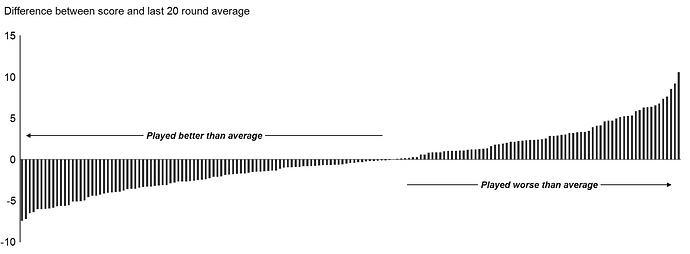Professionally, I’ve lived in the world of data analytics. However, I find there’s a very fine line for me to capture those data sets during my round and playing unemotional boring golf from shot to shot. I don’t use an app. I throw my phone in the bag when I play to eliminate distractions. As you’re capturing manually, its easy to get caught up in your shot performance and either press to recapture or let your emotions tank your performance. Left brain golf vs right brain golf. This is something I need figure out in 21.
Yeah, somewhat like schroedingers cat… by observing yourself, you can change the outcome.
That’s why I like my watch… I don’t worry about my data during the round and look at it afterward. The struggle for me is remembering to incorporate strategy and data into my shot selection instead of just going off my gut.
I think the value of something like Arccos is that it captures most of that data passively. It isn’t perfect and requires a bit of editing (esp on where you hit it on the green) but you can easily wait until the end of the round. As a data analytics person, i think you would really dig it.
I’m familiar with the application. It requires you to use your phone and keep it on you which is what I try to avoid. Believe the system needs access to your device’s mic.
Garmin watch + sensors would be an answer… honestly, the watch alone keeps track of where you hit each shot and you can go back and fill it it…
It took me a minute to get used to a watch on my wrist during golf, though…
Data collection on the golf course is improving and I think we will see more solutions over time… there are great options now if you want to make the effort, but as you said, it can pull your focus away from hitting the next shot and into analysis.
I haven’t weaponized my data set yet, but it has given me things to focus on… if I’m healthy next season, I’m hoping to have measurable improvement and hopefully the data I collect will be part of that…
Though I’m also hoping to use the data from simulators to improve my practice routines and build better knowledge of my miss patterns!
Plenty of good data available if we want to chase it down… taking action on it is the real challenge.
I don’t think it uses the mic but you either have to buy a device the clips to your belt or have the phone on you so it can communicate with the little gadgets you put on the end of each club that has accelerometers to detect if you hit a ball with them.
I’m a giant data nerd. Have kept personal stats in Excel for 20 years, Game Golf then Arccos, launch monitor at home (first Mevo then GC Quad), DECADE, Every Shot Counts, Lowest Score Wins, Salted Golf insoles, Live View camera, Zepp golf, @Fit_For_Golf, Superspeed…
Most useful data insights in no particular order
- Getting accurate base distances from a launch monitor. Wedges, yes, but also all iron distances… and locking in putting speeds (what putter swing gives me 22’ vs. 32’ vs. 8’). My distance control has never been better putting.
- Translating feels to driver clubhead and ball speed from a launch monitor. I used to just guess on a driving range. Now I know when a certain feel translates to a change of x MPH in clubhead speed or ball speed.
- Impact of “stupid” strokes from my personal stat tracking. I’m a 3 handicap, and I can tell you that I lose 4.7 strokes on average from penalty strokes, 2+ chips to get on a green, and 3-putts. Actionable insight: First, do no harm. This has been reinforced through DECADE, esp. re: penalty strokes.
- Distance >> Fairway >> Angles… from DECADE and Every Shot Counts
- How to allocate practice time leveraging Separation Value from Lowest Score Wins
- Too early to tell yet, but I’m confident that @Fit_For_Golf is going to make a difference re: clubhead speed
In terms of rabbit holes to be avoided: Still figuring out how to get value out of my Salted Golf insoles, though I haven’t given up yet. Various strokes-gained data has only been a little bit useful so far. Zepp was a waste of money. Mevo was a waste of money.
YMMV
Great post/thread.
One data question I have: how many strokes (to their index) do golfers typically add when playing a course for the first time?
This is awesome. Thanks for your info. My biggest concern is basically collecting data that isn’t actionable. It seems like you’ve honed down this process.
Any good drills or tips for using a simulator as we head into winter?
I’m not sure this question is answerable. Courses vary greatly… a course with a ton of blind tee shots where you aren’t sure where to aim is significantly different than an open course with little trouble.
I’d say, generically, having a home course you play 80% of your rounds on is worth 2-4 strokes… so take that as you will.
There are three things I’d do if I were on my sim for the first time:
- Iron distances (duh): What are you flying each iron. Probably don’t need more than ~3 reasonable shots per club.
- Experiment with driver feels: What kinds of swing thoughts give you the best clubhead speed and launch conditions. I wouldn’t underestimate launch conditions. With my barely 100 mph clubhead speed, I can carry the ball 230 or 260 depending on the launch conditions (launch angle and spin being two key things to look at)
- Wedge matrix: half, 3/4, 90% wedges for whatever your wedge set is. In addition to yardage, I’d also pay attention to landing angle and spin so you can get some sense of what the ball will do when it lands. Note that simulator “physics” don’t always mirror real life, so you’ll have to meditate on the landing angle and spin to give yourself some sense of how you think the ball will react when it lands.
One drill I just made up the other day is to randomize all the numbers between 5 and 30. Then I take my 60 degree wedge and try to fly the ball that exact distance. Take note of the distance between your target number and where you actually landed it. Sum those up. I’ve done it three times now, and my best is 40 total yards of difference.
All advice guaranteed to be effective or your money back 
Well, it turns out with 20 years of data, I can at least answer this question for myself…
In the last 20 years, I have played a course for the first time 101 times.
For each of those 101 rounds, I have the score that I shot, and using the slope and rating, I can translate that score into a handicap differential for that round (using the USGA formula).
I also have for each round the average of the handicap differentials for my 20 rounds immediately prior to that round. This allows me to compare my performance on each of those 101 rounds with my general performance trend leading up to that round.
When I compare how I shot on a new course… vs. the average of my 20 rounds immediately prior to that round… the average difference is… exactly 0.0!!!
I was not expecting that result.
Thank you! Very interesting. Not the result I was expecting either…
Awesome, I had planned on these drills mostly, so I’m glad to get some confirmation… I’m really excited to see some more data on my driver, as I think I’m giving up a ton of efficiency.
I also really want to prove to myself that my comfortable iron swing goes as far as my “full” iron swing, but I’ll let the data lead the way.
Awesome feedback, really appreciate it!
That’s super interesting, what do your outliers look like? Any big scores in either direction?
Maybe local knowledge is mostly a myth or rarely actionable?
Thanks for the hard data! That’s what I get for guessing!
Good point. I’ve noticed this inconsistency on my SkyTrak working on wedge shots and set the main distance number to display to “Carry” … not “Total”.
Yeah, my goal with the wedges is to get a consistent DISTANCE built in and basically ignore the number… then figure out how far that shot goes on the course.
I do track my stats. I track old-school stats, such as fairways hit, GIR, Up/Down percentage, par 3, par 4 and par 5 scoring, and overall score. I also track where I miss fairways and greens. I find that knowing my stats helps immensely with my enjoyment of the game by helping to set realistic expectations.
It also helps me pinpoint what I need to work on. I’ve been lucky enough to have a webinar with @ScottFawcettDECADE and I’ve also had many Twitter DM convos with @jon. One of the things both of them emphasized with me is that hitting Greens is key to scoring better. As I started tracking GIR stats, I could clearly see that I had 2 issues going on. 1) I was too aggressive with my targets, and 2) I needed to either move up a set of tees or add distance because it’s hard to hit greens when hitting a 6 iron or longer in (for me anyway). This initially led to me changing my strategy, then I got a lesson and now I’m working on distance.
For the year, my GIR percentage is up from 44% in 2019 to 48% in 2020. Over my last 20 rounds, I’m hitting 55% GIR. Also my handicap dropped from 4.0 at the start of the year to 2.5 now.
I think everyone should use data, but they have to figure out how to best use it for them.
Awesome! It is funny that a stat like GIR can be so useful when it’s easy to get into the weeds on other things… I will say that figuring out how to improve your GIR is the challenge, and likely different for most golfers.
As you said, it’s all about actionable data… how can you actually improve? One big realization for me was chasing birdies.
I asked my club pro for the data on Men’s day last year, and it was fascinating to see the breakdown of eagles, birdies, pars, bogeys and worse… The amount of birdies was much lower than I expected, and it’s taken me awhile to accept the concept of “birdies are what happens when you are making sure you make par”.
Instead of focusing on hitting wedges closer (one of my big drives last season), I’m now working on making sure I’m picking good targets and hitting greens more frequently… it’s been a helpful shift and also exposed how weak my putting is.
Actionable data! Hooray.

